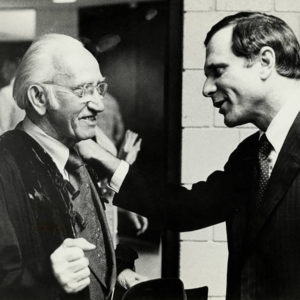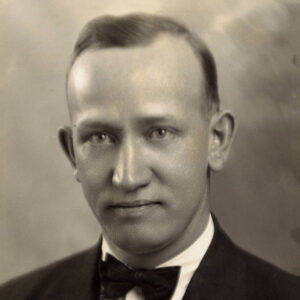calsfoundation@cals.org
Robert Allen Leflar (1901–1997)
Robert Allen Leflar was one of Arkansas’s most renowned legal scholars, a champion of racial equality, longtime dean of the University of Arkansas School of Law in Fayetteville (Washington County), and president of two state constitutional conventions.
Robert Leflar was born on March 22, 1901, in Siloam Springs (Benton County), the son of Lewis D. Leflar—who was a drayman, former deputy U.S. marshal in “Hanging Judge” Isaac Parker’s court, and former Alma (Crawford County) town marshal—and Viva Mae Pilkenton of Siloam Springs. The oldest of eight children, Leflar later said that his mother, a high school graduate, was the chief influence on him and his siblings getting an education.
Leflar worked his way through the University of Arkansas (UA), beginning in 1919 and earning his BA degree in 1922. He taught school at Stuttgart (Arkansas County), worked at UA’s news bureau in 1922 and 1923, and taught at John E. Brown College (now John Brown University) in Siloam Springs from 1923 to 1924. He entered Harvard Law School in 1927 and, among other courses, took a class in municipal corporations under future Supreme Court justice Felix Frankfurter. Leflar received an LLB degree from Harvard in 1927 and a Doctor of Juridical Science (SJD) degree in 1932. He was hired to teach at Arkansas’s new law school later that year. Other than a year of graduate law studies at Harvard in 1931–32, a visiting professorship at the University of Kansas in 1933, and another at the University of Missouri in 1936–37, Leflar would spend most of the rest of his career at the Fayetteville law school. He was granted the rank of full professor in September 1933.
Leflar was married twice: his first marriage, to Doris Drake, ended in divorce in 1945, and a year later he married Helen Finger, a union that lasted until her death on May 10, 1991. Leflar had three children—Helen Leflar, a foster child who was adopted by Leflar and his first wife, as well as two sons with Helen Finger: Robert B. and Charles Leflar.
In 1935, Governor J. Marion Futrell appointed Leflar to a special commission to update the state’s criminal justice statutes. The changes recommended were put into both a constitutional amendment (Amendment 21) and an initiated act that was passed at the 1936 general election. He also served from 1942 to 1944 as the attorney for the War Relocation Authority, which was the federal agency that oversaw the forcible removal of Japanese Americans from the West Coast shortly after the start of World War II.
In 1943, law school dean Julian Waterman retired, and Leflar was elevated to dean, although he did not formally begin his duties until his federal appointment ended in 1944. Leflar assumed the helm at a time of growth at the law school, fueled by large numbers of returning servicemen. The Arkansas Law Review was begun during his tenure, and he expanded the School for Legislators that had been established under Dean Waterman, with a law faculty member employing the use of a guide that contained the House and Senate rule books, various constitutional and statutory provisions, and a bill-drafting handbook. When the Arkansas Legislative Council was created in 1947, it had a provision that the law school’s dean would be an assistant to the council. He also oversaw the fundraising for, and construction of, a new law school building, Waterman Hall, in 1951.
Leflar was noted for his contributions to civil rights and constitutional reform in Arkansas. In 1948, he admitted Silas Hunt, the first African American to study law at a public university in the South, although Arkansas’s governor, Ben Laney, opposed desegregation. Leflar’s action, after engagement with a large cross-section of Arkansans and a pledge of non-interference from Laney, opened doors for a small but steadily growing number of African American attorneys, such as civil rights pioneer Wiley Branton. Leflar would recall later, “It was clear to me that, under the Constitution, blacks were entitled to admission, particularly to law schools.” But he downplayed the constitutional message to win support from university trustees and newspaper editors, as he stressed the potential for unfavorable publicity and a lawsuit, and admitted that he did not want to “go down in history as the losing defendant.” Leflar also developed an active interest and advocacy for constitutional revision, serving as president of the constitutional conventions of 1969 and 1979–80, and advising Governor Jim Guy Tucker on a similar effort in 1995. All three attempts were rejected by the voters. Outside of his legal scholarship, Leflar also authored The First 100 Years: Centennial History of the University of Arkansas, published in 1972.
Leflar served on the Arkansas Supreme Court from 1949 to 1951 and relinquished the deanship in 1954. He continued to teach until retiring in 1971, but he returned to teaching at the university in 1974. He also taught at New York University and held a series of visiting professorships. Leflar died on July 8, 1997, in Fayetteville.
For additional information:
Lancaster, Bob. “Living by the Rules.” Arkansas Times, August 1986, pp. 24–29, 60.
Leflar, Robert A. One Life in the Law: A 60-Year Review. Fayetteville: University of Arkansas Press, 1985.
Smith, George Rose. “Robert A. Leflar, Associate Justice.” Arkansas Law Review 25 (1971–1972): 89.
Revis Edmonds
Jonesboro, Arkansas
 Amendment 33
Amendment 33 Education, Higher
Education, Higher Law
Law Leflar and Pryor
Leflar and Pryor  Robert A. Leflar
Robert A. Leflar 




Comments
No comments on this entry yet.